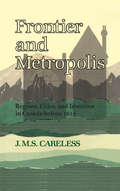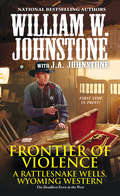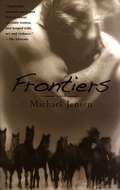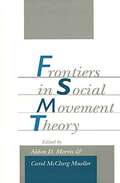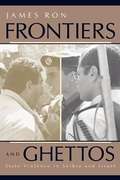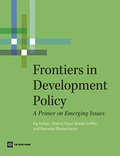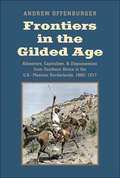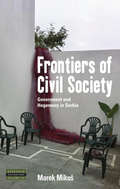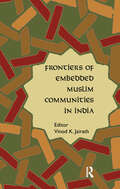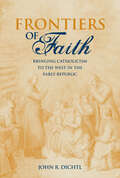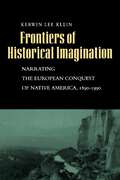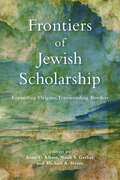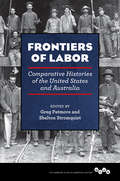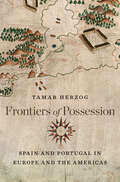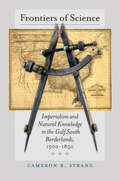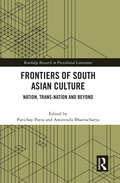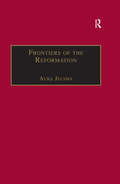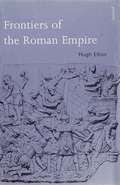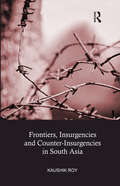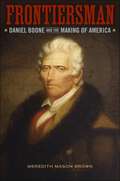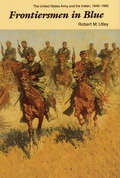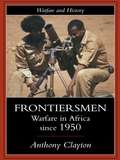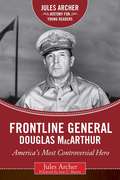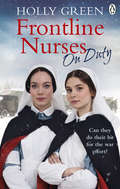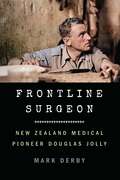- Table View
- List View
Frontier and Metropolis: Regions, Cities, and Identities in Canada before 1914
by J.M.S. CarelessThe regional character of Canada and the crucial role of metropolitan development in its history have been recurring themes in the work of J.M.S. Careless. In these essays he returns to those themes, discussing how national and regional identity in Canada show vital links with metropolitan-hinterland relationship across time and space.The first essay presents an overall appraisal of the historic connections between metropolitan centres and frontiers or regions in Canada. These connections might be manifested in economic structures, political fabrics, or social networks, and also in modes of opinion and popular images and traditions. The second part of the book inquires into some major conceptual treatments given to frontier and metropolis in history. The third seeks to evaluate the impact of metropolitanism on distinctive features of identity that are revealed in Canadian historical experience. A fourth essays rounds out the volume by discussing the influence of external metropolanism in Canada.Careless endows his subject with the combined fornce of his own continuing research, his sensitivity to the new historical scholarship, and the lively and penetrating mind that have made him one of Canada's leading historians for more than thirty years.
Frontier of Violence (Rattlesnake Wells, Wyoming #2)
by William W. Johnstone J. A. JohnstoneJohnstone Justice. What America Needs Now. Welcome to the most dangerous town in the West. For Marshal Bob Hatfield, that means rough justice and a hundred ways to die . . . In the shadow of the Prophecy Mountains, the ramshackle boomtown of Rattlesnake Wells draws schemers, predators, and desperate pilgrims. As for the law, that’s the town marshal, a former Texas outlaw trying to make a new life for himself. But Sundown Bob Hatfield knows a man who’s slick on the draw can’t escape trouble for long. In Rattlesnake Wells, you fight fire with fire—and a new one has just exploded. An enterprising saloon owner stages a shooting contest with a matched pair of gold-plated revolvers as first prize. But some contestants don’t play by the rules, and these aren’t just any old gold-plated guns. Now the guns are gone, innocent hostages have been taken for a violent ride, and a chase is on into the vast Wyoming wilderness—where a terrifying dark secret will be exposed, much blood will be spilled, and a fast-gun marshal will bring the real outlaws to their knees . . .
Frontiers
by Michael JensenThe year is 1797. John Chapman, an impulsive young man and a sexual outlaw, forsaken in the bitter winter of the Allegheny Plateau, clings to his one tenuous dream: to claim a future in the Western outpost. Unarmed and near death, Chapman is on the brink of giving up when an unexpected rescue changes his course in life forever, and he discovers the true meaning of survival. The mysterious savior is Daniel McQuay, a loner whose overpowering bond with Chapman is as shifting as a shadow, as dark as the prairie tale he spins for the impressionable young man. For Chapman, McQuay's story of a deranged killer clings to his transient soul like a nightmare, tracking him further south and into the safe haven of a gentle Indian woman named Gwennie. His journey also takes him into the intimate deliverance of Palmer, a brash but irresistibly innocent seventeen-year-old settler. As the three adventurers carve a new life out of the endless wilderness, they face the ultimate enemy, man, in a life-and-death struggle that unfolds in the shadow of a legendary and avenging evil. "Invigorated by hot sex scenes in bathtubs and amid thunderstorms. ... An appealing, well-researched tale, featuring a complicated and winsome hero who finds sexual fulfillment and a hard-won place for himself in a most unforgiving, and beautifully wrought setting." -Publishers Weekly
Frontiers In Social Movement Theory
by Aldon D. Morris Carol McClurg MuellerSocial protest movements such as the civil rights movement and the gay rights movement mobilize and sustain themselves in ways that have long been of interest to social scientists. In this book some of the most distinguished scholars in the area of collective action present new theories about this process, fashioning a rich and conceptually sophisticated social psychology of social movements that goes beyond theories currently in use. The book includes sometimes competing, sometimes complementary paradigms by theorists in resource mobilization, conflict, feminism, and collective action and by social psychologists and comparativists. These authors view the social movement actor from a more sociological perspective than do adherents of rational choice theory, and they analyze ways in which structural and cultural determinants influence the actor and generate or inhibit collective action and social change. The authors state that the collective identities and political consciousness of social movement actors are significantly shaped by their race, ethnicity, class, gender, or religion. Social structure--with its disparities in resources and opportunities--helps determine the nature of grievances, resources, and levels of organization. The book not only distinguishes the mobilization processes of consensus movements from those of conflict movements but also helps to explain the linkages between social movements, the state, and societal changes.
Frontiers and Ghettos: State Violence in Serbia and Israel
by James RonThis is an original and controversial comparison of Serbia and Israel, which critically examines state violence visited upon non-Serbians and Palestinians.
Frontiers in Development Policy
by Shahid Yusuf Raj Nallari Breda Griffith Rwitwika BhattacharyaThe global crisis of 2008-09 has brought to the forefront a plethora of economic and political policy issues. There is a re-opening of discussion on basic economic concepts, appropriate framework for analysis, role of private and public sectors in the economy, structural transformation of economies, human development and managing of growing risks and crises. The purpose of this book has been to bring home the inter-linkages in various parts of the economy and the need for practical policy making to reach development goals while being aware of the instabilities, complexities and downside risks inherent in the nature of a an economy operating in a globalized world. Thematically, this book focuses on two core types of policy: policies that promote strong, sustainable and inclusive growth in low income and middle income developing countries and new and emerging policies that necessitates a discussion amongst policy makers and practitioners. Throughout the book, the authors provide insight in to the different types of policy approaches that can be taken to help the economy grow. Ultimately the book looks to foster discussion amongst policy makers on growth and development.
Frontiers in the Gilded Age: Adventure, Capitalism, and Dispossession from Southern Africa to the U.S.-Mexican Borderlands, 1880-1917 (The Lamar Series in Western History)
by Andrew OffenburgerThe surprising connections between the American frontier and empire in southern Africa, and the people who participated in both This book begins in an era when romantic notions of American frontiering overlapped with Gilded Age extractive capitalism. In the late nineteenth century, the U.S.-Mexican borderlands constituted one stop of many where Americans chased capitalist dreams beyond the United States. Crisscrossing the American West, southern Africa, and northern Mexico, Andrew Offenburger examines how these frontier spaces could glitter with grandiose visions, expose the flawed and immoral strategies of profiteers, and yet reveal the capacity for resistance and resilience that indigenous people summoned when threatened. Linking together a series of stories about Boer exiles who settled in Mexico, a global network of protestant missionaries, and adventurers involved in the parallel displacements of indigenous peoples in Rhodesia and the Yaqui Indians in Mexico, Offenburger situates the borderlands of the Mexican North and the American Southwest within a global system, bound by common actors who interpreted their lives through a shared frontier ideology.
Frontiers of Civil Society: Government and Hegemony in Serbia (Dislocations #22)
by Marek MikušIn Serbia, as elsewhere in postsocialist Europe, the rise of “civil society” was expected to support a smooth transformation to Western models of liberal democracy and capitalism. More than twenty years after the Yugoslav wars, these expectations appear largely unmet. <P><P>Frontiers of Civil Society asks why, exploring the roles of multiple civil society forces in a set of government “reforms” of society and individuals in the early 2010s, and examining them in the broader context of social struggles over neoliberal restructuring and transnational integration.
Frontiers of Embedded Muslim Communities in India
by Vinod K. JairathThis volume approaches the study of Muslim societies through an evolutionary lens, challenging Islamic traditions, identities, communities, beliefs, practices and ideologies as static, frozen or unchangeable. It assumes that there is neither a monolithic, essential or authentic Islam, nor a homogeneous Muslim community. Similarly, there are no fixed binary oppositions such as between the ulama and sufi saints or textual and lived Islam. The overarching perspective — that there is no fixity in the meanings of Islamic symbols and that the language of Islam can be used by individuals, organizations, movements and political parties variously in religious and non-religious contexts — underlies the ethnographically rich essays that comprise this volume. Divided in three parts, the volume cumulatively presents an initial framework for the study of Muslim communities in India embedded in different regional and local contexts. The first part focuses on ethnographies of three Muslim communities (Kuchchhi Jatt, Irani Shia and Sidis) and their relationships with others, with shifting borders and frontiers; part two examines the issue of ‘caste’ of certain Muslim communities; and the third part, containing chapters on Tamil Nadu, Andhra Pradesh, Mumbai and Gujarat, looks at the varied responses of Muslims as Indian citizens in regional contexts at different historical moments. Although the volume focuses on Muslim communities in India, it is also meant to bridge an important gap in, and contribute to, the ‘sociology of India’ which has been organized and taught primarily as a sociology of Hindu society. The book will appeal to those in sociology, history, political science, education, modern South Asian Studies, and to the general reader interested in India & South Asia.
Frontiers of Faith: Bringing Catholicism to the West in the Early Republic
by John R. Dichtl“[A] vital history . . . it adds immensely to our understanding of the place of religion, especially Catholicism, in the nineteenth-century United States.” —American Historical ReviewFrontiers of Faith: Bringing Catholicism to the West in the Early Republic examines how Catholics in the early nineteenth-century Ohio Valley expanded their church and strengthened their connections to Rome alongside the rapid development of the Protestant Second Great Awakening. In competition with clergy of evangelical Protestant denominations, priests and bishops aggressively established congregations, constructed church buildings, ministered to the faithful, and sought converts. Catholic clergy also displayed the distinctive features of Catholicism that would inspire Catholics and, hopefully, impress others. The clerics’ optimism grew from the opportunities presented by the western frontier and the presence of non-Catholic neighbors. The fruit of these efforts was a European church translated to the American West. Using extensive correspondence, reports, diaries, court documents, apologetical works, and other records of the Catholic clergy, John R. Dichtl shows how Catholic leadership successfully pursued strategies of growth in frontier regions while continually weighing major decisions against what it perceived to be Protestant opinion. Frontiers of Faith helps restore Catholicism to the story of religious development in the early republic and emphasizes the importance of clerical and lay efforts to make sacred the landscape of the New West.“Dichtl’s work is thoroughly researched and meticulously documented, but he employs enough anecdotes of fiery priests, recalcitrant laymen, and saintly (and not-so-saintly) bishops to give his narrative a lively pace.” —Ohio Valley History“Dichtl has produced one of the finest studies of Catholicism in the early republic.” —Journal of the Early Republic
Frontiers of Historical Imagination: Narrating the European Conquest of Native America, 1890-1990
by Kerwin Lee KleinThe American frontier, a potent symbol since Europeans first stepped ashore on North America, serves as the touchstone for Kerwin Klein's analysis of the narrating of history. Klein explores the traditions through which historians, philosophers, anthropologists, and literary critics have understood the story of America's origin and the way those understandings have shaped and been shaped by changing conceptions of history. The American West was once the frontier space where migrating Europe collided with Native America, where the historical civilizations of the Old World met the nonhistorical wilds of the New. It was not only the cultural combat zone where American democracy was forged but also the ragged edge of History itself, where historical and nonhistorical defied and defined each other. Klein maintains that the idea of a collision between people with and without history still dominates public memory. But the collision, he believes, resounds even more powerfully in the historical imagination, which creates conflicts between narration and knowledge and carries them into the language used to describe the American frontier. In Klein's words, "We remain obscurely entangled in philosophies of history we no longer profess, and the very idea of 'America' balances on history's shifting frontiers."
Frontiers of Jewish Scholarship: Expanding Origins, Transcending Borders (Jewish Culture and Contexts)
by Anne O. Albert, Noah S. Gerber, and Michael A. MeyerThe birth of modern Jewish studies can be traced to the nineteenth-century emergence of the Wissenschaft des Judentums, a movement to promote a scholarly approach to the study of Judaism and Jewish culture. Frontiers of Jewish Scholarship offers a collection of essays examining how Wissenschaft extended beyond its original German intellectual contexts and was transformed into a diverse, global field. From the early expansion of the new scholarly approaches into Jewish publications across Europe to their translation and reinterpretation in the twentieth century, the studies included here collectively trace a path through largely neglected subject matter, newly recognized as deserving attention.Beginning with an introduction that surveys the field's German origins, fortunes, and contexts, the volume goes on to document dimensions of the growth of Wissenschaft des Judentums elsewhere in Europe and throughout the world. Some of the contributions turn to literary and semantic issues, while others reveal the penetration of Jewish studies into new national contexts that include Hungary, Italy, and even India. Individual essays explore how the United States, along with Israel, emerged as a main center for Jewish historical scholarship and how critical Jewish scholarship began to accommodate Zionist ideology originating in Eastern Europe and eventually Marxist ideology, primarily in the Soviet Union. Finally, the focus of the volume moves on to the land of Israel, focusing on the reception of Orientalism and Jewish scholarly contacts with Yemenite and native Muslim intellectuals.Taken together, the contributors to the volume offer new material and fresh approaches that rethink the relationship of Jewish studies to the larger enterprise of critical scholarship while highlighting its relevance to the history of humanistic inquiry worldwide.
Frontiers of Labor: Comparative Histories of the United States and Australia (Working Class in American History)
by Shelton Stromquist Greg PatmoreAlike in many aspects of their histories, Australia and the United States diverge in striking ways when it comes to their working classes, labor relations, and politics. Greg Patmore and Shelton Stromquist curate innovative essays that use transnational and comparative analysis to explore the two nations' differences. The contributors examine five major areas: World War I's impact on labor and socialist movements; the history of coerced labor; patterns of ethnic and class identification; forms of working-class collective action; and the struggles related to trade union democracy and independent working-class politics. Throughout, many essays highlight how hard-won transnational ties allowed Australians and Americans to influence each other's trade union and political cultures. Contributors: Robin Archer, Nikola Balnave, James R. Barrett, Bradley Bowden, Verity Burgmann, Robert Cherny, Peter Clayworth, Tom Goyens, Dianne Hall, Benjamin Huf, Jennie Jeppesen, Marjorie A. Jerrard, Jeffrey A. Johnson, Diane Kirkby, Elizabeth Malcolm, Patrick O'Leary, Greg Patmore, Scott Stephenson, Peta Stevenson-Clarke, Shelton Stromquist, and Nathan Wise
Frontiers of Possession: Spain and Portugal in Europe and the Americas
by Tamar HerzogA “lucid” analysis of the territorial formation of Spain and Portugal in both Europe and the Americas (Publishers Weekly).Frontiers of Possession asks how territorial borders were established in Europe and the Americas during the early modern period and challenges the standard view that national boundaries are largely determined by military conflicts and treaties. Focusing on Spanish and Portuguese claims in the New and Old Worlds, Tamar Herzog reconstructs the different ways land rights were negotiated and enforced, sometimes violently, among people who remembered old possessions or envisioned new ones: farmers and nobles, clergymen and missionaries, settlers and indigenous peoples.Questioning the habitual narrative that sees the Americas as a logical extension of the Old World, Herzog portrays Spain and Portugal on both sides of the Atlantic as one unified imperial space. She begins in the Americas, where Iberian conquerors had to decide who could settle the land, who could harvest fruit and cut timber, and who had river rights for travel and trade. The presence of indigenous peoples as enemies to vanquish or allies to befriend, along with the vastness of the land, complicated the picture, as did the promise of unlimited wealth. In Europe, meanwhile, the formation and re-formation of boundaries could last centuries, as ancient entitlements clashed with evolving economic conditions and changing political views and juridical doctrines regarding how land could be acquired and maintained.Herzog demonstrates that the same fundamental questions had to be addressed in Europe and in the Americas. Territorial control was always subject to negotiation, as neighbors and outsiders, in their quotidian interactions, carved out and defended new frontiers of possession.Praise for Frontiers of Possession“Herzog succeeds in her aim of moving beyond the usually separate histories of Spain and Portugal—and of Europe and the Americas—to complicate the accepted understanding of national and imperial boundaries as immutable facts rather than as ongoing sites of contestation.” —William O’Connor, The Daily Beast“This book is about as thorough a research work as this reviewer has ever encountered . . . This is a truly innovative and well-documented interpretation of this topic.” —D. L. Tengwall, Choice“The best account we now have of the long legal and political rivalry between the world’s first modern imperial powers.” —Anthony Pagden, author of The Enlightenment and Why It Still Matters
Frontiers of Science: Imperialism and Natural Knowledge in the Gulf South Borderlands, 1500-1850 (Published by the Omohundro Institute of Early American History and Culture and the University of North Carolina Press)
by Cameron B. StrangCameron Strang takes American scientific thought and discoveries away from the learned societies, museums, and teaching halls of the Northeast and puts the production of knowledge about the natural world in the context of competing empires and an expanding republic in the Gulf South. People often dismissed by starched northeasterners as nonintellectuals--Indian sages, African slaves, Spanish officials, Irishmen on the make, clearers of land and drivers of men--were also scientific observers, gatherers, organizers, and reporters. Skulls and stems, birds and bugs, rocks and maps, tall tales and fertile hypotheses came from them. They collected, described, and sent the objects that scientists gazed on and interpreted in polite Philadelphia. They made knowledge.Frontiers of Science offers a new framework for approaching American intellectual history, one that transcends political and cultural boundaries and reveals persistence across the colonial and national eras. The pursuit of knowledge in the United States did not cohere around democratic politics or the influence of liberty. It was, as in other empires, divided by multiple loyalties and identities, organized through contested hierarchies of ethnicity and place, and reliant on violence. By discovering the lost intellectual history of one region, Strang shows us how to recover a continent for science.
Frontiers of South Asian Culture: Nation, Trans-Nation and Beyond (Routledge Research in Postcolonial Literatures)
by Parichay Patra Amitendu BhattacharyaThis book is the first of its kind to concentrate significantly on trans-nation and transnationalism, and its dialogue with various nationalisms in South Asia. Transnationalism as a conceptual apparatus has rarely been explored in South Asian academia, despite its prevalence as a research method in the Euro-US domain. Taking this absence/dearth as a crucial juncture as well as a point of intervention, this book intends to push the boundaries further by organizing a dialogue between the nation-state and many nationalisms and the emergent method of transnationalism, going beyond the borders of the Indian state and engaging with Sri Lanka and Bangladesh. It opens itself up for such cross-border movements, formulating the trans-South Asian discursive exchange necessitated by contemporary theoretical upheavals. It looks at such exchanges through the prism(s) of literature and cinema. The book traces the various modes of engagement that exist between some of the globally dominant literary and cinematic forms, trying to locate these engagements and negotiations across three geopolitical formations and locations of culture, namely region, nation and trans-nation. These three locations work as contact zones where cultural interfaces manifest in various forms.
Frontiers of the Reformation: Dissidence and Orthodoxy in Sixteenth-Century Europe (St Andrews Studies in Reformation History)
by Auke JelsmaIn this fascinating collection, Auke Jelsma explores the byways and outer reaches of the Reformation: groups and individuals who, in an age of confessional strife, eschewed the certainties of the established churches and sought religious truth in unconventional ways and across confessional boundaries. The author, one of the most distinguished Dutch Church historians of his generation, casts a humane and sympathetic light on forms of belief that in their own day attracted censure from the orthodox of both sides, and have been little considered in subsequent general treatments of the Reformation. Subjects include the Congregation of Windesheim and its influence on Protestantism; the role of women in the Anabaptist kingdom of Münster; the Devil in Protestantism; the Protestant attack on popular culture; marriage and the family; the sixteenth-century reception of St John of the Cross and Protestant spirituality.
Frontiers of the Roman Empire (The\archaeology Of The Roman Empire Ser.)
by Hugh EltonWith its succinct analysis of the overriding issues and detailed case-studies based on the latest archaeological research, this social and economic study of Roman Imperial frontiers is essential reading.Too often the frontier has been represented as a simple linear boundary. The reality, argues Dr Elton, was rather a fuzzy set of interlocking zones - political, military, judicial and financial.After discussion of frontier theory and types of frontier, the author analyses the acquisition of an empire and the ways in which it was ruled. He addresses the vexed question of how to define the edges of provinces, and covers the relationship with allied kingdoms. Regional variation and different rates of change are seen as significant - as is illustrated by Civilis' revolt on the Rhine in AD 69. He uses another case-study - Dura-Europos - to exemplify the role of the army on the frontier, especially its relations with the population on both sides of the border. The central importance of trade is highlighted by special consideration of Palmyra.
Frontiers, Insurgencies and Counter-Insurgencies in South Asia
by Kaushik RoyThis book uses cross-cultural analysis across Eurasia and Afro-Asia to trace the roots of contemporary border disputes and insurgencies in South Asia. It discusses the way frontiers of British India, and consequently the modern states of India and Pakistan, were drafted through negotiations backed up by organized violence, showing how this conce
Frontiersman: Daniel Boone and the Making of America (Southern Biography Series)
by Meredith Mason BrownThe name Daniel Boone conjures up the image of an illiterate, coonskin cap-wearing patriot who settled Kentucky and killed countless Indians. The scarcity of surviving autobiographical material has allowed tellers of his story to fashion a Boone of their own liking, and his myth has evolved in countless stories, biographies, novels, poems, and paintings. In this welcome book, Meredith Mason Brown separates the real Daniel Boone from the many fables that surround him, revealing a man far more complex -- and far more interesting -- than his legend.Brown traces Boone's life from his Pennsylvania childhood to his experiences in the militia and his rise as an unexcelled woodsman, explorer, and backcountry leader. In the process, we meet the authentic Boone: he didn't wear coonskin caps; he read and wrote better than many frontiersmen; he was not the first to settle Kentucky; he took no pleasure in killing Indians. At once a loner and a leader, a Quaker who became a skilled frontier fighter, Boone is a study in contradictions. Devoted to his wife and children, he nevertheless embarked on long hunts that could keep him from home for two years or more. A captain in colonial Virginia's militia, Boone later fought against the British and their Indian allies in the Revolutionary War before he moved to Missouri when it was still Spanish territory and became a Spanish civil servant. Boone did indeed kill Indians during the bloody fighting for Kentucky, but he also respected Indians, became the adopted son of a Shawnee chief, and formed lasting friendships with many Shawnees who once held him captive.During Boone's lifetime (1734--1820), America evolved from a group of colonies with fewer than a million inhabitants clustered along the Atlantic Coast to an independent nation of close to ten million reaching well beyond the Mississippi River. Frontiersman is the first biography to explore Boone's crucial role in that transformation. Hundreds of thousands of settlers entered Kentucky on the road that Boone and his axemen blazed from the Cumberland Gap to the Kentucky River. Boone's leadership in the defense of Boonesborough during a sustained Indian attack in 1778 was instrumental in preventing white settlers from fleeing Kentucky during the bloody years of the Revolution. And Boone's move to Missouri in 1799 and his exploration up the Missouri River helped encourage a flood of settlers into that region. Through his colorful chronicle of Boone's experiences, Brown paints a rich portrayal of colonial and Revolutionary America, the relations between whites and Indians, the opening and settling of the Old West, and the birth of the American national identity. Supported with copious maps, illustrations, endnotes, and a detailed chronology of Boone's life, Frontiersman provides a fresh and accurate rendering of a man most people know only as a folk hero -- and of the nation that has mythologized him for over two centuries.
Frontiersmen in Blue: The United States Army and the Indian, 1848-1865
by Robert M. UtleyFrontiersmen in Blue is a comprehensive history of the achievements and failures of the United States Regular and Volunteer Armies that confronted the Indian tribes of the West in the two decades between the Mexican War and the close of the Civil War. Between 1848 and 1865 the men in blue fought nearly all of the western tribes. Robert Utley describes many of these skirmishes in consummate detail, including descriptions of garrison life that was sometimes agonizingly isolated, sometimes caught in the lightning moments of desperate battle.
Frontiersmen: Warfare In Africa Since 1950 (Warfare and History)
by Anthony ClaytonSince 1950, there has been almost continuous military unrest in Africa. This study offers an overview of warfare in this period, examining a military tradition that ranges from the highly sophisticated electronic, air and armour fighting between South Africa and Angola-Cuban forces, to the spears and machetes of the Rwandan genocide. The author explores two themes: first, that warfare in North Africa has principally been a matter of identity and secondly, that warfare south of the Sahara is comparable with that of pre-colonial Africa - conflicts of frontiersmen trying to extend their control over land and resources. Exploring liberation campaigns, civil wars, ethnic conflicts and wars between nations, this study provides an authoritative military history of Africa over half a century.
Frontline General: America's Most Controversial Hero (History for Young Readers)
by Jules Archer Iain C. MartinAt twenty-six Douglas MacArthur was military aide to President Theodore Roosevelt, and his courageous leadership of the Rainbow Division in World War I made him a general. At the same time, his reluctance to heed any authority but his own gained him a reputation of arrogance and insubordination that was to shadow his entire career.As MacArthur helped guide defeated Japan to democracy, it was remarked that he himself tolerated no democratic questioning of his commands. When he was summoned from Japan to take command of the desperately beleaguered forces in Korea, the conflict between duty and pride brought his career to a dramatic conclusion. With brilliant generalship he saved his army from defeat, only to be removed from his post when he refused to obey the president himself. Douglas MacArthur’s deeds were of heroic proportion, but he is, and will continue to be, one of America’s most controversial figures.
Frontline Nurses On Duty: A moving and emotional historical novel (Frontline Nurses Series #2)
by Holly GreenCan they do their bit for the war effort?A gripping historical saga based on a true story, following wartime nurses during the First World War. Perfect for fans of Lizzie Page’s The War Nurses, Donna Douglas’s The Nightingale Nurses and Margaret Dickinson’s The Poppy Girls.When war is declared in 1914, Leonora Malham Brown and her best friend Victoria, head to Calais to volunteer with the First Aid Nursing Yeomanry. But Leonora is torn between doing her duty and love. Determined to see her sweetheart, Colonel Malkovic, again she soon decides to return to the Front. Leonora quickly loses hope of ever finding Sasha as she gets caught up in the chaos of the battlefields. Finding herself alone and in danger, she must use all her nursing training if she is to return home safely…A moving emotional wartime saga about brave nurses on the battlefield, based on an amazing true story. ________________________________Make sure you've read all the books in the Frontline Nurses series:1. Frontline Nurses2. Frontline Nurses On Duty3. Secrets of the Frontline NursesAnd don't miss Holly Green's new series set in a Liverpool Workhouse:1. Workhouse Orphans2. Workhouse Angel3. Workhouse Nightingale4. Workhouse Girl
Frontline Surgeon: New Zealand Medical Pioneer Douglas Jolly
by Mark DerbyAlthough a young doctor when he volunteered for the Spanish Civil War in late 1936, New Zealander Douglas Jolly swiftly acquired a reputation as one of the most gifted and energetic surgeons of the Republican Army&’s medical services. Over the next two years he performed countless life-saving operations on wounded combatants from both sides of the conflict, as well as on civilians. Tireless, dedicated, and courageous, he developed significant and innovative treatment systems based on the principle of working as near as possible to the front line. Jolly used this unprecedented battlefield experience to write a manual that was widely used in World War II and the Korean and Vietnam Wars.Frontline Surgeon traces Jolly&’s remarkable career from medical training in 1920s New Zealand, postgraduate study during the rise of fascism in Europe, almost a decade of frontline surgery, and into civilian life as medical director of Britain&’s largest hospital for amputees. One of the greatest war surgeons of the twentieth century, Jolly has been mysteriously omitted from the ranks of pioneers of modern medicine. This engaging biography, intensively researched in many countries, both explains and redresses that omission.
